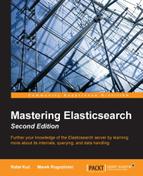Let's forget about the shard placement and how to configure it—at least for a moment. In addition to all the fancy stuff that Elasticsearch allows us to set for shards and replicas, we also have the possibility to specify where our queries (and other operations, for example, the real-time GET) should be executed.
Before we get into the details, let's look at our example cluster:
As you can see, we have three nodes and a single index called mastering. Our index is divided into two primary shards, and there is one replica for each primary shard.
In order to control where the query (and other operations) we are sending will be executed, we can use the
preference parameter, which can be set to one of the following values:
_primary: Using this property, the operations we are sending will only be executed on primary shards. So, if we send a query againstmasteringindex with the preference parameter set to the_primaryvalue, we would have it executed on the nodes with the namesnode1andnode2. For example, if you know that your primary shards are in one rack and the replicas are in other racks, you may want to execute the operation on primary shards to avoid network traffic._primary_first: This option is similar to the_primaryvalue's behavior but with a failover mechanism. If we ran a query against themasteringindex with the preference parameter set to the_primary_firstvalue, we would have it executed on the nodes with the namesnode1andnode2; however, if one (or more) of the primary shards fails, the query will be executed against the other shard, which in our case is allocated to a node namednode3. As we said, this is very similar to the_primaryvalue but with additional fallback to replicas if the primary shard is not available for some reason._local: Elasticsearch will prefer to execute the operation on a local node, if possible. For example, if we send a query tonode3with the preference parameter set to_local, we would end up having that query executed on that node. However, if we send the same query tonode2, we would end up with one query executed against the primary shard numbered1(which is located on that node) and the second part of the query will be executed againstnode1ornode3where the shard numbered0resides. This is especially useful while trying to minimize the network latency; while using the_localpreference, we ensure that our queries are executed locally whenever possible (for example, when running a client connection from a local node or sending a query to a node).- _
only_node:wJq0kPSHTHCovjuCsVK0-A: This operation will be only executed against a node with the provided identifier (which iswJq0kPSHTHCovjuCsVK0-Ain this case). So in our case, the query would be executed against two replicas located onnode3. Please remember that if there aren't enough shards to cover all the index data, the query will be executed against only the shard available in the specified node. For example, if we set the preference parameter to_only_node:6GVd-ktcS2um4uM4AAJQhQ, we would end up having our query executed against a single shard. This can be useful for examples where we know that one of our nodes is more powerful than the other ones and we want some of the queries to be executed only on that node. _prefer_node:wJq0kPSHTHCovjuCsVK0-A: This option sets the preference parameter to_prefer_node: the value followed by a node identifier (which iswJq0kPSHTHCovjuCsVK0-Ain our case) will result in Elasticsearch preferring the mentioned node while executing the query, but if some shards are not available on the preferred node, Elasticsearch will send the appropriate query parts to nodes where the shards are available. Similar to the_only_nodeoption,_prefer_nodecan be used while choosing a particular node, with a fall back to other nodes, however._shards:0,1: This is the preference value that allows us to identify which shards the operation should be executed against (in our case, it will be all the shards, because we only have shards0and1in themasteringindex). This is the only preference parameter value that can be combined with the other mentioned values. For example, in order to locally execute our query against the0and1shard, we should concatenate the0,1value with_localusing the;character, so the final value of the preference parameter should look like this:0,1;_local. Allowing us to execute the operation against a single shard can be useful for diagnosis purposes.- custom, string value: Setting the
_preferenceparameter to a custom value will guarantee that the query with the same custom value will be executed against the same shards. For example, if we send a query with the_preferenceparameter set to themastering_elasticsearchvalue, we would end up having the query executed against primary shards located on nodes namednode1andnode2. If we send another query with the same preference parameter value, then the second query will again be executed against the shards located on nodes namednode1andnode2. This functionality can help us in cases where we have different refresh rates and we don't want our users to see different results while repeating requests. There is one more thing missing, which is the default behavior. What Elasticsearch will do by default is that it will randomize the operation between shards and replicas. If we sent many queries, we would end up having the same (or almost the same) number of queries run against each of the shards and replicas.
..................Content has been hidden....................
You can't read the all page of ebook, please click here login for view all page.
